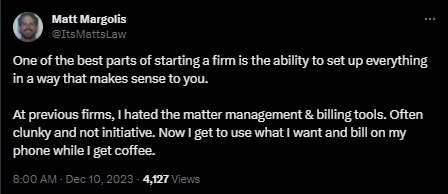It’s holiday party season for lawyers, and, man-o-man, have I spent a bit too much time around tipsy lawyers over the past few weeks (disclaimer: I’ve been to 2 parties).
It’s also the time of year for: all-nighter transaction work; squeezing files for extra billable hours; year end bonuses; meetings with compensation committees; and polishing up resumes for when all of the above go wrong.
Long story short, these are stressful, uncertain times, and I seem to be answering a lot of the same questions about leaving Big Law and starting a law firm.
So, for those of you who have stressed-out lawyers in your lives, I offer these suggestions as my 2023 Gift Guide for Disgruntled Lawyers.

Want to start your own firm, but have no idea where to start? Buy your lawyer a year subscription to Clio, a comprehensive online practice management platform that offers everything needed to run a law firm: time tracking; billing; online payments; document management; contacts; case and matter management; and everything else. Clio integrates with hundreds of third-party apps, and it’s designed to be the central hub through which all operations run. It’s awesome and costs about $1,000 per year. And, of course, it’s fully online (and secure), so there’s no need for that $25,000 on-site server that makes those strange buzzing noises behind the locked door at the old law firm.
What about everything else? That’s where an annual subscription to Microsoft365 comes in. For about $150, you get e-mail (Outlook), Word, Excel, Powerpoint, Teams, OneDrive, Sharepoint, and about 25 other programs that you’ve never heard of, but are awesome and useful (Bookings has changed my life). Plus, unless you’ve been living under a rock, you probably know that Microsoft is an industry leader on AI research, and you’ll get to be on the frontlines of Microsoft Copilot. That weird picture at the top of this post? It was AI generated by Microsoft Designer.

I haven’t seen anything about phones yet. Here, you’ve got two good options. The industry standard for video communications, Zoom, is now offering VoIP phone services (with pricing starting at $120 annually). Since you will have to get Zoom (all of the remote court appearances and conferences are on Zoom), this is worth looking into. (I use Ringcentral for phone, fax, and business texting, and it’s a bit wonky, but it works).
What about copies, printing and scanning? Most lawyers probably use some high-capacity printer, which is rented from a third party service (and the firm pays a monthly fee and a per page quota each month). You don’t need that. Find a good, mid-quality print/copy/scan machine from HP, which will cost you about $500.
What about the fancy offices? Don’t sign a 5 or 10 year lease for commercial office space. Instead, call one of the 5-7 fancy coworking spaces that have opened in Nashville. I use WeWork, which has been awesome (and has accommodated me in Austin, Chicago, and Seoul). Other options on Music Row include Ampersand Studios, Industrious, Kennect, and e-spaces. These spaces are all “turn key,” meaning they offer printing, internet, limited staffing, and package handling for a low monthly membership fee, generally ranging from $200 to $350.
What about websites and marketing? Some lawyers do this themselves. I don’t recommend that because branding is too important. For all of my various iterations of my own law firm, I’ve used Huckleberry Branding. They’ve designed my logos, helped with color schemes, designed a custom website, helped with content, and also all the incidentals that come with it all (including letterhead, envelopes, and business cards). While I’m embarrassed to have done this 3 times, I’d hire them again if there were a 4th time. They are awesome, and getting started with good branding is too important to do on your own.
What about staffing? You may wonder about who will do all the “little things” to keep the new firm running. (At my old firm, there was a person dedicated to making sure there were cold Cokes at all the meetings.) At a small firm, the lawyer will do all these little things, as well as the medium and big things. To make it a little easier, I’d recommend hiring a phone answering service. I use Abby Connect, a 24/7 answering service whose goal is serve as an extension of my own firm. I’ve used others (Posh) in the past, and the main differentiating factor tends to be pricing and frequency of use. These services cost range from $200 to $500 per month.
What about everything else? Stamps.com for everyday mail. Simple Certified Mail for certified mail. Simplifile to record documents (state-wide) with Register of Deeds’ offices. Lawpay to accept credit card payments (and, yes, Clio offers Clio Payments). If you’ve got lots of documents and need to super-charge document management, the biggest player in the market is NetDocuments (which I use) and is about $75.00 per user per month. I use Minnesota Lawyers Mutual Insurance as my malpractice carrier, and I can’t tell you if they are any good because I hope to never call them ever (about $150.00 a month for robust coverage).
What if this is still too complicated? Buy them a one-hour “Ask an Expert” call with Adriana Linares, of Law Tech Partners, a lawyer-turned-legal-technology consultant who takes a no-nonsense approach to coaching up entrepreneurs on making the early-firm decisions, as well as the late-firm decisions (I had a call with Adriana a few weeks ago).
It’s wild to think that you can run a fully functioning law firm for under $1,000 a month, but it’s entirely possible. It’s also lots of fun to explore all the innovations in legal technology. It’s an unprecedented time for growth in legal tech, and a lawyer with an entrepreneurial spirit has more options now than ever before in how she can practice law.
If there’s a lawyer in your life who believes her law firm isn’t giving her the freedom to nurture that entrepreneurial spirit, I hope this Gift Guide is the first step to a fruitful and lucrative 2024.
If any of you are thinking about making this jump, reach out with any questions, fears, or complaints. I’m happy to help. If I’ve left anything out or if you have any other questions, let me know, and I’ll respond.







